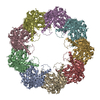+ Open data
Open data
- Basic information
Basic information
| Entry | Database: PDB / ID: 3j1c | ||||||
|---|---|---|---|---|---|---|---|
| Title | Cryo-EM structure of 9-fold symmetric rATcpn-alpha in apo state | ||||||
 Components Components | Chaperonin alpha subunit | ||||||
 Keywords Keywords | CHAPERONE / Group II chaperonin | ||||||
| Function / homology |  Function and homology information Function and homology informationATP-dependent protein folding chaperone / unfolded protein binding / ATP hydrolysis activity / ATP binding Similarity search - Function | ||||||
| Biological species |  Acidianus tengchongensis (archaea) Acidianus tengchongensis (archaea) | ||||||
| Method | ELECTRON MICROSCOPY / single particle reconstruction / cryo EM / Resolution: 9.1 Å | ||||||
 Authors Authors | Zhang, K. / Wang, L. / Liu, Y.X. / Wang, X. / Gao, B. / Hu, Z.J. / Ji, G. / Chan, K.Y. / Schulten, K. / Dong, Z.Y. / Sun, F. | ||||||
 Citation Citation |  Journal: Protein Cell / Year: 2013 Journal: Protein Cell / Year: 2013Title: Flexible interwoven termini determine the thermal stability of thermosomes. Authors: Kai Zhang / Li Wang / Yanxin Liu / Kwok-Yan Chan / Xiaoyun Pang / Klaus Schulten / Zhiyang Dong / Fei Sun /  Abstract: Group II chaperonins, which assemble as double-ring complexes, assist in the refolding of nascent peptides or denatured proteins in an ATP-dependent manner. The molecular mechanism of group II ...Group II chaperonins, which assemble as double-ring complexes, assist in the refolding of nascent peptides or denatured proteins in an ATP-dependent manner. The molecular mechanism of group II chaperonin assembly and thermal stability is yet to be elucidated. Here, we selected the group II chaperonins (cpn-α and cpn-β), also called thermosomes, from Acidianus tengchongensis and investigated their assembly and thermal stability. We found that the binding of ATP or its analogs contributed to the successful assembly of thermosomes and enhanced their thermal stabilities. Cpn-β is more thermally stable than cpn-α, while the thermal stability of the hetero thermosome cpn-αβ is intermediate. Cryo-electron microscopy reconstructions of cpn-α and cpn-β revealed the interwoven densities of their non-conserved flexible N/C-termini around the equatorial planes. The deletion or swapping of their termini and pH-dependent thermal stability assays revealed the key role of the termini electrostatic interactions in the assembly and thermal stability of the thermosomes. | ||||||
| History |
|
- Structure visualization
Structure visualization
| Movie |
 Movie viewer Movie viewer |
|---|---|
| Structure viewer | Molecule:  Molmil Molmil Jmol/JSmol Jmol/JSmol |
- Downloads & links
Downloads & links
- Download
Download
| PDBx/mmCIF format |  3j1c.cif.gz 3j1c.cif.gz | 1.4 MB | Display |  PDBx/mmCIF format PDBx/mmCIF format |
|---|---|---|---|---|
| PDB format |  pdb3j1c.ent.gz pdb3j1c.ent.gz | 1.2 MB | Display |  PDB format PDB format |
| PDBx/mmJSON format |  3j1c.json.gz 3j1c.json.gz | Tree view |  PDBx/mmJSON format PDBx/mmJSON format | |
| Others |  Other downloads Other downloads |
-Validation report
| Arichive directory |  https://data.pdbj.org/pub/pdb/validation_reports/j1/3j1c https://data.pdbj.org/pub/pdb/validation_reports/j1/3j1c ftp://data.pdbj.org/pub/pdb/validation_reports/j1/3j1c ftp://data.pdbj.org/pub/pdb/validation_reports/j1/3j1c | HTTPS FTP |
|---|
-Related structure data
| Related structure data |  5392MC  5391C  5395C  5396C  3j1bC  3j1eC  3j1fC  3j1d  3j1g  3j1h  3j1i  3j1j  3j1k  3j1l M: map data used to model this data C: citing same article ( |
|---|---|
| Similar structure data |
- Links
Links
- Assembly
Assembly
| Deposited unit | 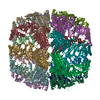
|
|---|---|
| 1 |
|
- Components
Components
| #1: Protein | Mass: 60269.285 Da / Num. of mol.: 18 Source method: isolated from a genetically manipulated source Source: (gene. exp.)  Acidianus tengchongensis (archaea) / Production host: Acidianus tengchongensis (archaea) / Production host:  |
|---|
-Experimental details
-Experiment
| Experiment | Method: ELECTRON MICROSCOPY |
|---|---|
| EM experiment | Aggregation state: PARTICLE / 3D reconstruction method: single particle reconstruction |
- Sample preparation
Sample preparation
| Component | Name: 9-fold symmetric rATcpn-alpha in apo state / Type: COMPLEX Details: Hexadecamer. This sample has about 90% 8-fold symmetric particles and about 10% 9-fold symmetric particles. Synonym: Thermosome |
|---|---|
| Buffer solution | Name: Tris-HCl / pH: 7.5 / Details: Tris-HCl |
| Specimen | Conc.: 3 mg/ml / Embedding applied: NO / Shadowing applied: NO / Staining applied: NO / Vitrification applied: YES |
| Specimen support | Details: This sample was applied to a 400-mesh GiG grid with holes of 2 um diameter and 2 um spacing. |
| Vitrification | Instrument: FEI VITROBOT MARK IV / Cryogen name: NITROGEN / Humidity: 100 % Details: Blot for 4 seconds before plunging into liquid nitrogen (FEI Vitrobot Mark IV). |
- Electron microscopy imaging
Electron microscopy imaging
| Experimental equipment |  Model: Titan Krios / Image courtesy: FEI Company |
|---|---|
| Microscopy | Model: FEI TITAN KRIOS / Date: Jul 23, 2010 |
| Electron gun | Electron source:  FIELD EMISSION GUN / Accelerating voltage: 300 kV / Illumination mode: FLOOD BEAM FIELD EMISSION GUN / Accelerating voltage: 300 kV / Illumination mode: FLOOD BEAM |
| Electron lens | Mode: BRIGHT FIELD / Nominal magnification: 96000 X / Calibrated magnification: 96000 X / Nominal defocus max: 3500 nm / Nominal defocus min: 1500 nm / Cs: 2.7 mm |
| Specimen holder | Temperature: 90 K |
| Image recording | Electron dose: 20 e/Å2 / Film or detector model: GATAN ULTRASCAN 4000 (4k x 4k) / Details: 4k x 4k |
| Image scans | Num. digital images: 3424 |
| Radiation | Protocol: SINGLE WAVELENGTH / Monochromatic (M) / Laue (L): M / Scattering type: x-ray |
| Radiation wavelength | Relative weight: 1 |
- Processing
Processing
| EM software |
| ||||||||||||||||
|---|---|---|---|---|---|---|---|---|---|---|---|---|---|---|---|---|---|
| CTF correction | Details: The whole micrograph | ||||||||||||||||
| Symmetry | Point symmetry: C9 (9 fold cyclic) | ||||||||||||||||
| 3D reconstruction | Resolution: 9.1 Å / Num. of particles: 9596 / Details: Spider, EMAN1.9 / Symmetry type: POINT | ||||||||||||||||
| Atomic model building | Protocol: FLEXIBLE FIT / Space: REAL Details: METHOD--symmetry-restrained MDFF REFINEMENT PROTOCOL--Rigid body and Molecular Dynamics Flexible Fitting | ||||||||||||||||
| Atomic model building | PDB-ID: 3KO1 Accession code: 3KO1 / Source name: PDB / Type: experimental model | ||||||||||||||||
| Refinement step | Cycle: LAST
|
 Movie
Movie Controller
Controller




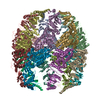
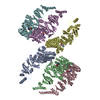
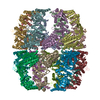

 PDBj
PDBj
